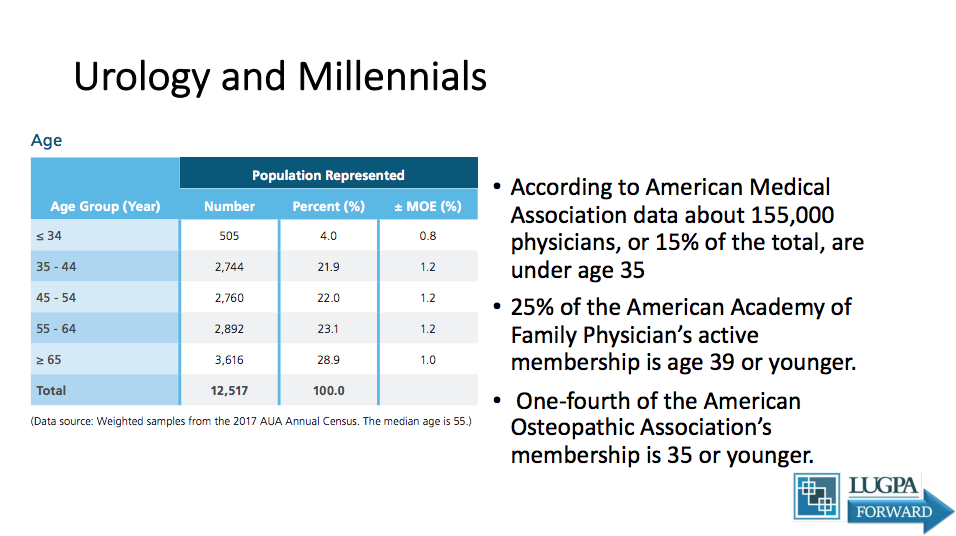Jason N. Hafron, MD, presented “What Makes Millennials Tick? Understanding the Young Urologist” during the 29th Annual International Prostate Cancer Update on January 26, 2019 in Beaver Creek, Colorado.
How to cite: Hafron, Jason N. “What Makes Millennials Tick? Understanding the Young Urologist” January 26, 2019. Accessed Jun 2025. https://grandroundsinurology.com/what-makes-millennials-tick-understanding-the-young-urologist/
What Makes Millennials Tick? Understanding the Young Urologist – Summary:
Jason M. Hafron, MD, discusses the growing presence of millennials in the workplace, particularly in urologic practices. He emphasizes that millennial physicians’ have the ability to advance the urologic field by applying their talents and perspectives regarding technology, efficiency, and physician/patient relationships.
Abstract:
Millennials will direct the future of urology, and they may have a different approach and set of priorities regarding medicine than current physicians do.
Millennials will comprise more than 1 in 3 adult Americans by 2020, and will then make up as much as 75% of the United States workforce by 2025. In 2016, Millennials will surpass Baby Boomers as the largest population group.
A generation’s attitudes, values, and beliefs develop during significant life events in their formative years. Attributes generally ascribed to the millennial generation include dependence on technology, valuing a work/life balance, and having less reverence for authority. Millennials are also the most culturally diverse generation to date. The older generation of physicians may sometimes perceive millennials as entitled, disloyal, needing praise and feedback, needing answers to questions, as well as having authority issues. Millennials are in a position to conflict with older generations due to their differing outlook and priorities on life.
If urologists alienate and resist this generation, patients will consequently stand to suffer. Urologists must instead recognize the advantages of the unique aspects millennials have to offer. Millennials can apply their unique talents and perspectives, such as the aptitude with technologies, innate desire for efficiency, and tendencies to break down barriers between physicians and patients, to their work in urology and catapult the field forward. Acknowledging, respecting, and understanding millennials’ values will create an overall loyal and driven workforce.
About the International Prostate Cancer Update
The International Prostate Cancer Update (IPCU) is an annual, multi-day CME conference focused on prostate cancer treatment updates. The conference’s faculty consists of international experts, and the event caters to urologists, medical oncologists, radiation oncologists, and other healthcare professionals. Topics encompass prostate cancer management, from diagnosis to treating advanced and metastatic disease. Dr. Hafron presented this lecture during the 29th IPCU in 2019. Please visit this page in order to learn more about future IPCU meetings.
ABOUT THE AUTHOR
Jason M. Hafron, MD, is the Director of Research at the Michigan Institute of Urology, P.C. He is also an Associate Professor of Urology at the William Beaumont School of Medicine at Oakland University in Rochester, Michigan, and the Director of Robotic Surgery at Beaumont Hospital, Royal Oak. Dr. Hafron is experienced in all areas of adult urology, but specializes in the minimally invasive treatment of cancers involving the prostate, kidney, and bladder utilizing laparoscopic and robotic surgery. Dr. Hafron received his BS from the University of Michigan and his MD from Loyola University Chicago-Stritch School of Medicine. Dr. Hafron completed his General Surgery and Urology Residency at the Albert Einstein College of Medicine Montefiore Medical Center in New York City. He continued his training as a Fellow in Advanced Laparoscopic and Robotic Surgery at the Cleveland Clinic Foundation, Glickman Urological and Kidney Institute, in Cleveland, Ohio.
Dr. Hafron has published numerous peer-reviewed articles and has presented his work at national and international meetings. He is the principal investigator for multiple clinical research trials at the Michigan Institute of Urology. He is on the Board of Directors of the United Physicians Organization, and has been certified in urology by the American Board of Urology.





